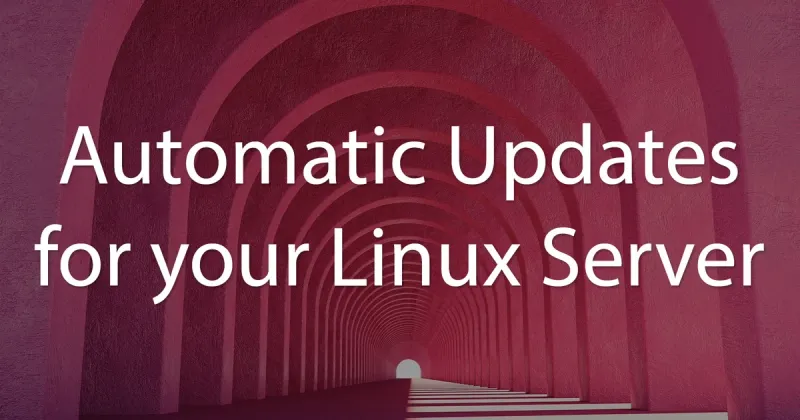Streamline Your Linux Experience with Automatic Updates

Staying up-to-date with software updates and security patches is important for a secure computing experience. However, manually keeping track of updates and performing system reboots can be time-consuming and prone to oversight. Enter UnattendedUpgrades, a powerful utility for Debian that automates the update process, keeping your system current. In this guide, we will walk through the installation and customization of UnattendedUpgrades on Debian Linux, exploring features like modifying update schedules and scheduling reboots.
Installation
Install unattended-upgrades.
sudo apt install -y unattended-upgradesActivate it.
sudo dpkg-reconfigure -plow unattended-upgradesBy default, the system will check for and download upgrades twice a day:
- A random time in a 12 hour window starting at 6 AM
- A random time in a 12 hour window starting at 6 PM
It will then apply the upgrades once per day in a random time in a 60 minute window starting at 6 AM.
Modify the Schedule
You can override the default schedule when upgrades are downloaded.
sudo systemctl edit apt-daily.timerAnd editor will open. In the top section, enter the following.
[Timer]
OnCalendar=
OnCalendar=01:00The above example sets the upgrades to download around 1 AM every day.
The line OnCalendar= (blank) is necessary because, without it, any additional
OnCalendar lines simply add another time to the existing defaults. This
line clears the defaults first.
Once the overrides are in place, restart the timer.
sudo systemctl restart apt-daily.timerYou can override the default schedule when upgrades are applied, as well.
sudo systemctl edit apt-daily-upgrade.timerFollow the same procedure as when you edited the apt-daily.timer above: Write
the timer configuration lines and restart the timer.
Scheduled Reboots
Some upgrades require rebooting the system. One strategy is to set a specific day of the month to check and perform a reboot if required.
Create the script to check and reboot if required at
/usr/local/bin/reboot_if_required.sh.
#!/bin/bash
if [ -f /var/run/reboot-required ]; then
echo "Reboot required. Initiating reboot..."
/sbin/shutdown -r now
else
echo "No reboot required."
fiMake the script executable.
sudo chmod +x reboot_if_required.shCreate a systemd service for the script at
/etc/systemd/system/unattended_reboot.service.
[Unit]
Description=Reboot (if required)
[Service]
Type=oneshot
ExecStart=/usr/local/bin/reboot_if_required.sh
[Install]
WantedBy=default.targetCreate a matching timer for the service at
/etc/systemd/system/unattended_reboot.timer.
[Unit]
Description=Reboot (if required) once per month on the 15th at 11 PM
[Timer]
OnCalendar=*-15 23:00:00
Persistent=true
[Install]
WantedBy=timers.targetEnable the timer.
sudo systemctl enable unattended_reboot.timerStart the timer.
sudo systemctl start unattended_reboot.timerRebooting Immediately After Upgrades
You could take a more aggressive rebooting strategy instead. You can set the system to automatically reboot after UnattendedUpgrades detects that one is pending.
Edit /etc/apt/apt.conf.d/50unattended-upgrades. Uncomment this line:
//Unattended-Upgrade::Automatic-Reboot "false";And change false to true.
Unattended-Upgrade::Automatic-Reboot "true";Manual Rebooting
If you don’t use either of the two automatic options above, you can manually
reboot when it works for you. You can check if a reboot is pending by checking
for the presence of /var/run/reboot-required.
ls /var/run/reboot-requiredIf the file exists, consider rebooting at some point.
sudo shutdown -r nowYour server is now set up to apply automatic updates.
UnattendedUpgrades on Debian Linux is a game-changer when it comes to automating the update process and enhancing the overall stability and security of your system. By following the steps outlined in this article, you’ve learned how to install and activate UnattendedUpgrades, customize the update schedule to fit your needs, schedule reboots for minimal disruption, immediately reboot after upgrades, and manually reboot when necessary. Automation frees up your time, reduces the risk of missing critical updates, and ensures your Debian Linux system remains resilient and up-to-date. With this setup, you always know that your system is fortified against emerging vulnerabilities.
Cover photo by Mohamed Nohassi on Unsplash.
 Travis Horn
Travis Horn